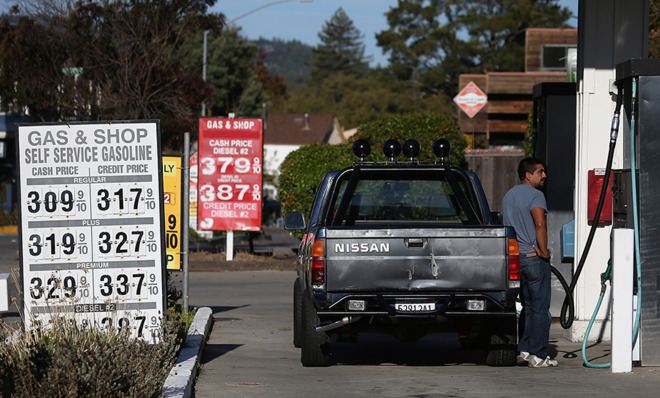The real grand bargain that is within Congress' reach
Republicans and Democrats may not agree on much these days. But a big deal on energy and infrastructure could bridge the gap.

A free daily email with the biggest news stories of the day – and the best features from TheWeek.com
You are now subscribed
Your newsletter sign-up was successful
If there was any doubt that Republicans want to lift the ban on crude oil exports, Rep. Joe Barton (R-Texas) has put it to rest.
Calling the restriction "outdated" in a press release, the conservative congressman from the Dallas suburbs introduced H.R. 5814 this week, which would eliminate the provisions of a 1975 law that has strictly limited the amount of crude that can leave the United States. The move comes ahead of a Thursday hearing on the same topic in the House Energy & Commerce Committee, of which Barton is chairman emeritus.
The bill might strike fear in the hearts of progressives, if only because it signals that Barton is certain to reintroduce it next year, when it will have a much better chance of passing the Republican-controlled Senate.
The Week
Escape your echo chamber. Get the facts behind the news, plus analysis from multiple perspectives.

Sign up for The Week's Free Newsletters
From our morning news briefing to a weekly Good News Newsletter, get the best of The Week delivered directly to your inbox.
From our morning news briefing to a weekly Good News Newsletter, get the best of The Week delivered directly to your inbox.
As long as President Obama remains in power, however, the GOP will need the support of congressional Democrats if they want to override the threat of a veto. And the Democrats should give it to them, but only if they can extract a specific concession: an increase in the federal gas tax.
The end of oil protectionism
To date, the chief progressive argument against allowing U.S. crude exports has been an environmental one, namely that it will encourage more oil production. But on closer examination, this fear doesn't hold as much water as many liberals would like to think.
For one, more oil in the global market will likely drive prices lower. No one is sure at what price point investments in extracting tight oil becomes uneconomical, but the recent crude price drop suggests we may be reaching that level. It is unlikely, then, that lifting the crude ban would lead to the immediate production rush many have predicted.
A free daily email with the biggest news stories of the day – and the best features from TheWeek.com
Furthermore, if the export ban is coupled with a heftier gas tax, over the long term it is likely to constrain runaway emissions growth, as American consumers react to higher prices at the pump and car manufacturers respond with more fuel efficient vehicles.
The right time, the right reasons
One of the government's most pressing needs is to address the gas tax, which when done right allows federal and state governments to combat the detrimental impact of gasoline use by investing in more efficient infrastructure via the Highway Trust Fund.
As it stands, however, the federal gas tax is too meager to do much good. At 18.4 cents per gallon, it only has about 60 percent of the purchasing power it had in 1993, the year it was last raised. At the same time, Americans are driving around 700 million more miles per year than they did two decades ago, making the country's need for increased infrastructure funding even greater.
A litany of commentators has noted that the substantial drop in gasoline prices presents a ripe opportunity to increase the gas tax without placing too much of a financial burden on American consumers. Now that we know for sure Republicans will try to lift the export ban, progressives who have long sought a gas-tax hike should strike a grand bargain with Republican lawmakers who might previously have opposed it.
Key to the plan is the fact that, contrary to popular belief, allowing U.S. companies to ship crude oil overseas would actually lower the price of gas at the pump. According to a recent Brookings report, the decrease would be about 9 cents per gallon.
As a result, the aggregate reduction in prices caused by adding more crude oil to the global market will, all other things being equal, balance out an increase in the gas tax. Americans will pay the same price at the pump, but a greater portion of the money will fund sorely needed infrastructure investment.
Improving the state of the Highway Trust Fund, meanwhile, would address progressives' environmental concerns.
A recent study from the Texas A&M Transportation Institute estimated that road congestion in 2011 produced an additional 56 billion pounds of carbon dioxide in the U.S. Increased infrastructure spending would address this problem not only through new road projects, but also by investing in public transportation via the trust fund's Mass Transit Account.
A golden opportunity
It is a simple fact that our oil use will not change radically in the future. This era of low oil prices could prove to be short-lived, however, which is why the current state of affairs presents a golden opportunity for both parties to make long-desired changes to our energy policy.
Republicans have long complained about what they see as an overly active government role in setting domestic oil prices. Democrats, for their part, would love to see a return to high levels of public-works investment.
A grand bargain would allow both parties to get something they want. In the long run, the whole country will benefit.
Neil Bhatiya is a Policy Associate at The Century Foundation, where he works on issues related to U.S. foreign policy, with a specific focus on South Asia and climate change.
-
 How the FCC’s ‘equal time’ rule works
How the FCC’s ‘equal time’ rule worksIn the Spotlight The law is at the heart of the Colbert-CBS conflict
-
 What is the endgame in the DHS shutdown?
What is the endgame in the DHS shutdown?Today’s Big Question Democrats want to rein in ICE’s immigration crackdown
-
 ‘Poor time management isn’t just an inconvenience’
‘Poor time management isn’t just an inconvenience’Instant Opinion Opinion, comment and editorials of the day
-
 The billionaires’ wealth tax: a catastrophe for California?
The billionaires’ wealth tax: a catastrophe for California?Talking Point Peter Thiel and Larry Page preparing to change state residency
-
 Bari Weiss’ ‘60 Minutes’ scandal is about more than one report
Bari Weiss’ ‘60 Minutes’ scandal is about more than one reportIN THE SPOTLIGHT By blocking an approved segment on a controversial prison holding US deportees in El Salvador, the editor-in-chief of CBS News has become the main story
-
 Has Zohran Mamdani shown the Democrats how to win again?
Has Zohran Mamdani shown the Democrats how to win again?Today’s Big Question New York City mayoral election touted as victory for left-wing populists but moderate centrist wins elsewhere present more complex path for Democratic Party
-
 Millions turn out for anti-Trump ‘No Kings’ rallies
Millions turn out for anti-Trump ‘No Kings’ ralliesSpeed Read An estimated 7 million people participated, 2 million more than at the first ‘No Kings’ protest in June
-
 Ghislaine Maxwell: angling for a Trump pardon
Ghislaine Maxwell: angling for a Trump pardonTalking Point Convicted sex trafficker's testimony could shed new light on president's links to Jeffrey Epstein
-
 The last words and final moments of 40 presidents
The last words and final moments of 40 presidentsThe Explainer Some are eloquent quotes worthy of the holders of the highest office in the nation, and others... aren't
-
 The JFK files: the truth at last?
The JFK files: the truth at last?In The Spotlight More than 64,000 previously classified documents relating the 1963 assassination of John F. Kennedy have been released by the Trump administration
-
 'Seriously, not literally': how should the world take Donald Trump?
'Seriously, not literally': how should the world take Donald Trump?Today's big question White House rhetoric and reality look likely to become increasingly blurred


